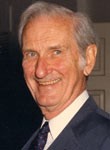Bill Gordon, father of Arecibo Observatory, dies at 92
By Lauren Gold
William E. Gordon, founder of the Arecibo Observatory in Puerto Rico, died Feb. 16 at his home in Ithaca. He was 92.
Gordon was the Walter R. Reed Professor of Electrical Engineering at Cornell in 1958 when he began designing the radio telescope to study the Earth's upper atmosphere and nearby space.
Built in the limestone hills of northwest Puerto Rico and funded by the U.S. Defense Advanced Research Projects Agency, the 305-meter (1,000-foot)-wide telescope is the most powerful radio telescope in the world; and a central tool for research in astronomy, atmospheric science, planetary science and engineering.
Gordon will be remembered as "one of the world's great radio telescope designers," said Cornell President Emeritus Dale Corson, who was dean of the College of Engineering in 1959, when the telescope was being designed.
"Gordon's concept of using a natural earth form to support a 1,000-foot-diameter reflector to focus radio waves was ingenious and challenging," Corson said. "A spherical reflector does not focus the radio waves at a point but along a line, and he had to devise a way to collect those waves, which he and his staff did in brilliant fashion."
Gordon served as the observatory's director until 1965. Using the radar signals reflected by electrons, he studied the temperature, density, chemical composition and other properties of the ionosphere, which he called "both the gateway to space and our first line of defense against the deadly radiation streaming toward us from the sun and other stars."
That research continues to have practical applications in communications, air travel, space exploration, weather and climate; and it offers insight into the evolution and dynamics of the Earth's atmosphere.
Gordon designed the observatory, now operated by Cornell through the National Astronomy and Ionosphere Center for the National Science Foundation. Four decades, two major upgrades and dozens of historic discoveries later, it remains a unique and vital scientific tool.
Since 1963, researchers at Arecibo have established the rate of rotation of Mercury; discovered the first pulsar in a binary system (leading to the Nobel Prize); produced radar maps of the geologic surface of Venus; discovered the first planets outside the solar system; probed the composition of the most distant galaxies; and observed near earth objects with unparalleled precision.
Born Jan. 8, 1918, in Paterson, N.J., Gordon earned his bachelor's degree from New Jersey State Teacher's College, a master's from New York University and Ph.D. from Cornell.
During World War II, Gordon served in the Air Force as captain and electronics engineer, and worked with the National Defense Research Committee on the effects of weather on radar range. He came to Cornell as a research associate in1948, and in 1950 published (with Henry G. Booker) the theory of radio wave scattering in the troposphere. He rose quickly through the faculty ranks, and had received the Reed professorship by 1958.
In 1966 Gordon moved to Rice University, where he served as a professor, dean, provost and vice president before retiring in 1986.
Gordon was a member of the National Academy of Sciences and the National Academy of Engineering; a foreign associate of the Engineering Academy of Japan; and a fellow of the American Academy of Arts and Sciences, American Association for the Advancement of Science, American Geophysical Union and Institute of Electrical and Electronics Engineers.
At the 40th anniversary celebration of the telescope's inauguration in 2003, Gordon recalled the skeptics who didn't believe it could be built. "We were young enough that we didn't know we couldn't do it," he said. "We had no rules or precedents." He added: "If you dream, have big dreams. And have talented supporters to help you."
Gordon is survived by his wife, Elizabeth, and two children from his first marriage. His first wife, Elva, died in 2001.
Get Cornell news delivered right to your inbox.
Subscribe